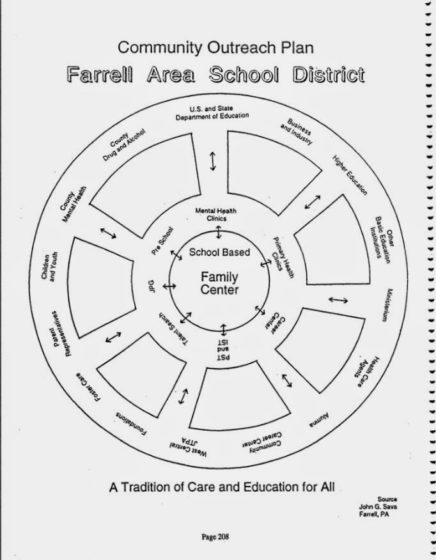ALERT: Parents are on the OUTSIDE of this circle because of the new definition of FAMILY.
This is regarding a previous blog post “Womb to Tomb,” reviewing the article by Patrick Wall titled “City launches $52 million plan to turn 40 schools into service hubs,” Note this quote:
“Governor Cuomo has set aside $15 million in competitive grants for schools to adopt community services, and the Obama administration has funded “Promise Neighborhoods” across the country where young people can access an array of services in and around their schools.”
21st Century Community School Hubs called Promise Neighborhood Schools by Obama are embedded in the Re-authorization of the Elementary and Secondary Education Act (ESEA). Please read the excerpts below. This bill will:
– Extend the school day to all day
– Sets up community schools known as school based clinics
– Sets up across domain testing
– Re-defines the family
– Initiates “partnerships”
– Sets up integrated services for mental health wrap around services
– Schools become “hospitals” that can bill Medicaid
NOTE: This is Hillarycare under Obama. I testified to the Department of Interior in 1995 about schools applying for a partial hospitalization license so they can bill Medicaid. All affective domain or any “at risk” student can qualify for mental health wrap-around services. This means any child not meeting Common Core (or reform by any other name) will be at risk. An “at risk” child, or a Title I child, would be deemed educationally deprived.
SB 1094 Re-authorization of ESEA. Ugh. This bill is 1150 pages. But these pages tell the story about Community Schools. NOTE: 21st Century Community Schools are included in the ESEA flexibility waiver, also. But not in this detail. See last entry below.
Access the full bill HERE.
Page 708
SEC. 4107. 21ST CENTURY COMMUNITY LEARNING CENTERS.
Part F of title IV, as redesignated by section 4103(a) of this Act, is amended—
Page 712 Partnerships begin
Page 728 Promise Neighborhoods and ” Community of Practice”- those entities that promote and share best practices in the neighborhood
Page 729
(4) COMPREHENSIVE SCHOOL READINESS ASSESSMENT.—The term ‘comprehensive school readiness assessment’ ’ means an objective tool that
(A) screens for school readiness across domains, including language, cognitive, physical, motor, sensory, and social-emotional domains, and through a developmental screening.;
PART G—PROMISE NEIGHBORHOODS ‘‘SEC. 4701. SHORT TITLE.
This part may be cited as the ‘Promise Neighborhoods Act of 2013’.
Page 731
(8) FAMILY AND STUDENT SUPPORTS.—The term ‘family and student supports’ includes—
(A) health programs (including both mental health and physical health services);
(B) school, public, and child-safety programs;
(C) programs that improve family stability;
(D) workforce development programs (including those that meet local business needs, such as internships and externships);
(E) social service programs;
(F) legal aid programs;
(G) financial literacy education programs;
(H) adult education and family literacy programs;
(I) parent, family, and community engagement programs; and
(J) programs that increase access to learning technology and enhance the digital literacy skills of students.
(9) FAMILY MEMBER.—The term ‘family member’ means a parent, relative, or other adult who is responsible for the education, care, and well- being of a child.
Page 732
INTEGRATED STUDENT SUPPORTS.—The term ‘integrated student supports’ means wrap- around services, supports, and community resources, which shall be offered through a site coordinator for at-risk students, that have been shown by evidence- based research—
(A) to increase academic achievement and engagement;
(B) to support positive child development; and
(C) to increase student preparedness for success in college and the workforce.
ESEA Flexibility Waiver- see the box below. Oklahoma checked this box in their waiver.
Optional Flexibility:
An SEA should check the box below only if it chooses to request a waiver of the following requirements:
The requirements in ESEA sections 4201(b)(1)(A) and 4204(b)(2)(A) that restrict the activities provided by a community learning center under the Twenty-First Century Community Learning Centers (21st CCLC) program to activities provided only during non-school hours or periods when school is not in session (i.e., before and after school or during summer recess). The SEA requests this waiver so that 21st CCLC funds may be used to support expanded learning time during the school day in addition to activities during non-school hours or periods when school is not in session.
For further information, see my report “Womb to Tomb.”
